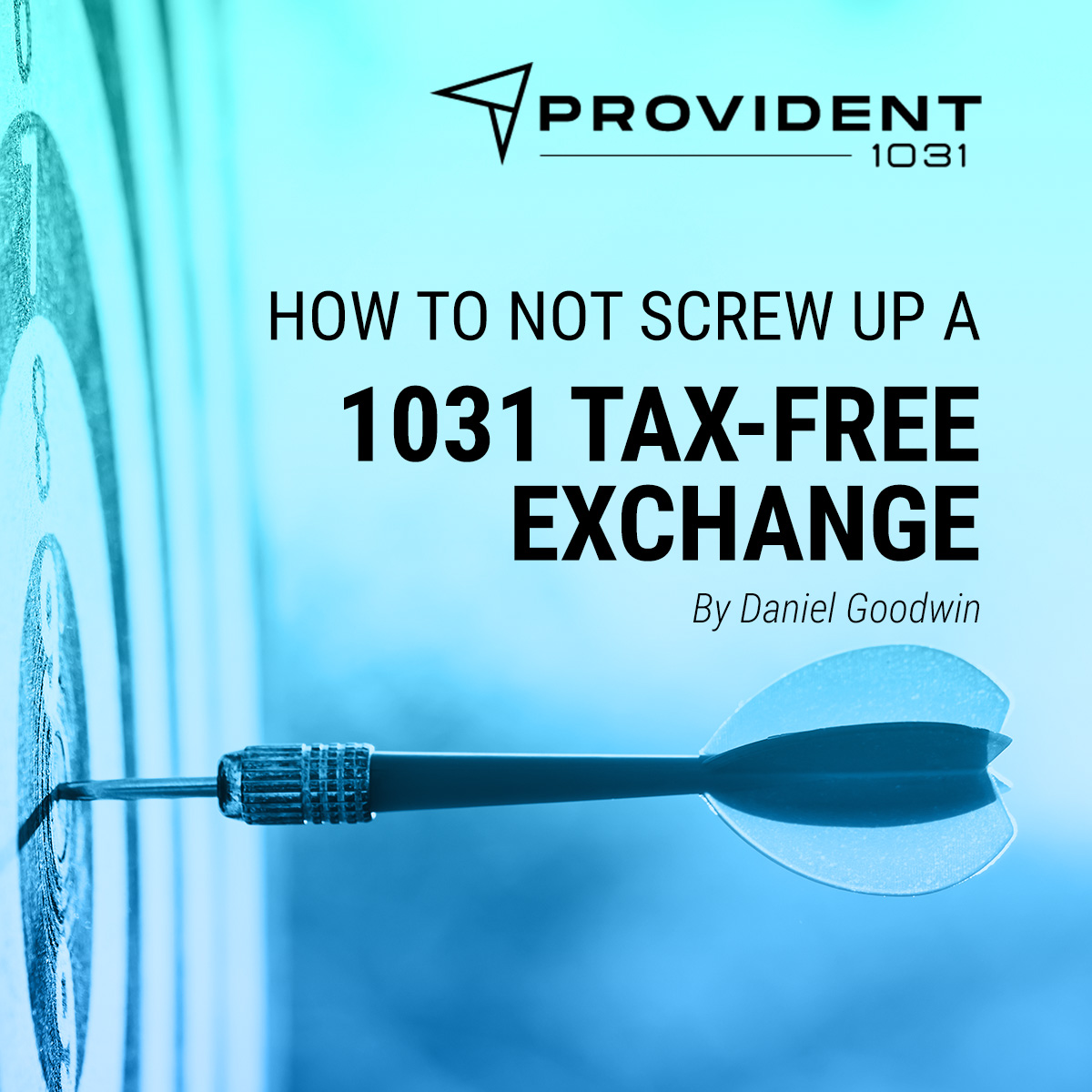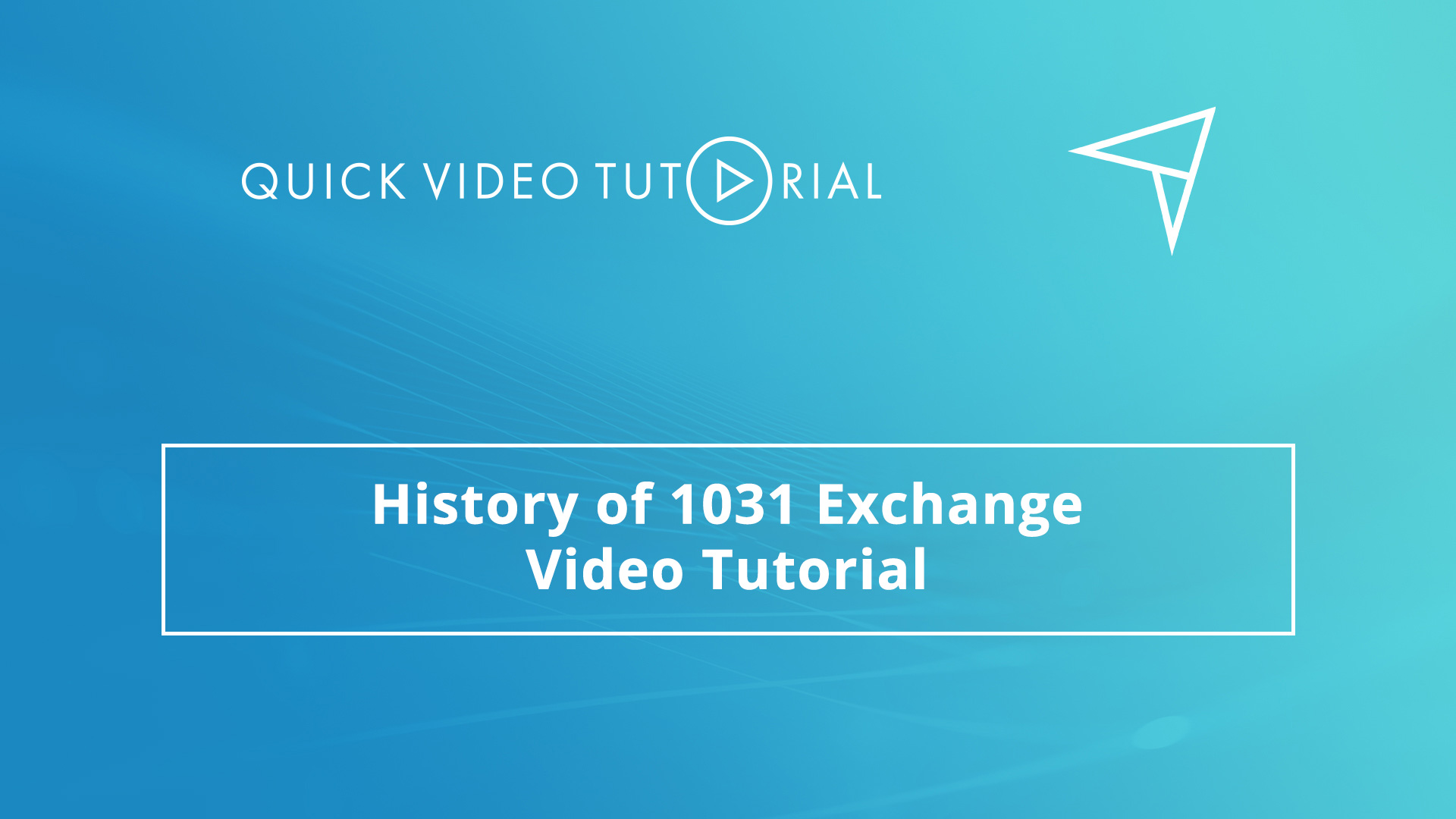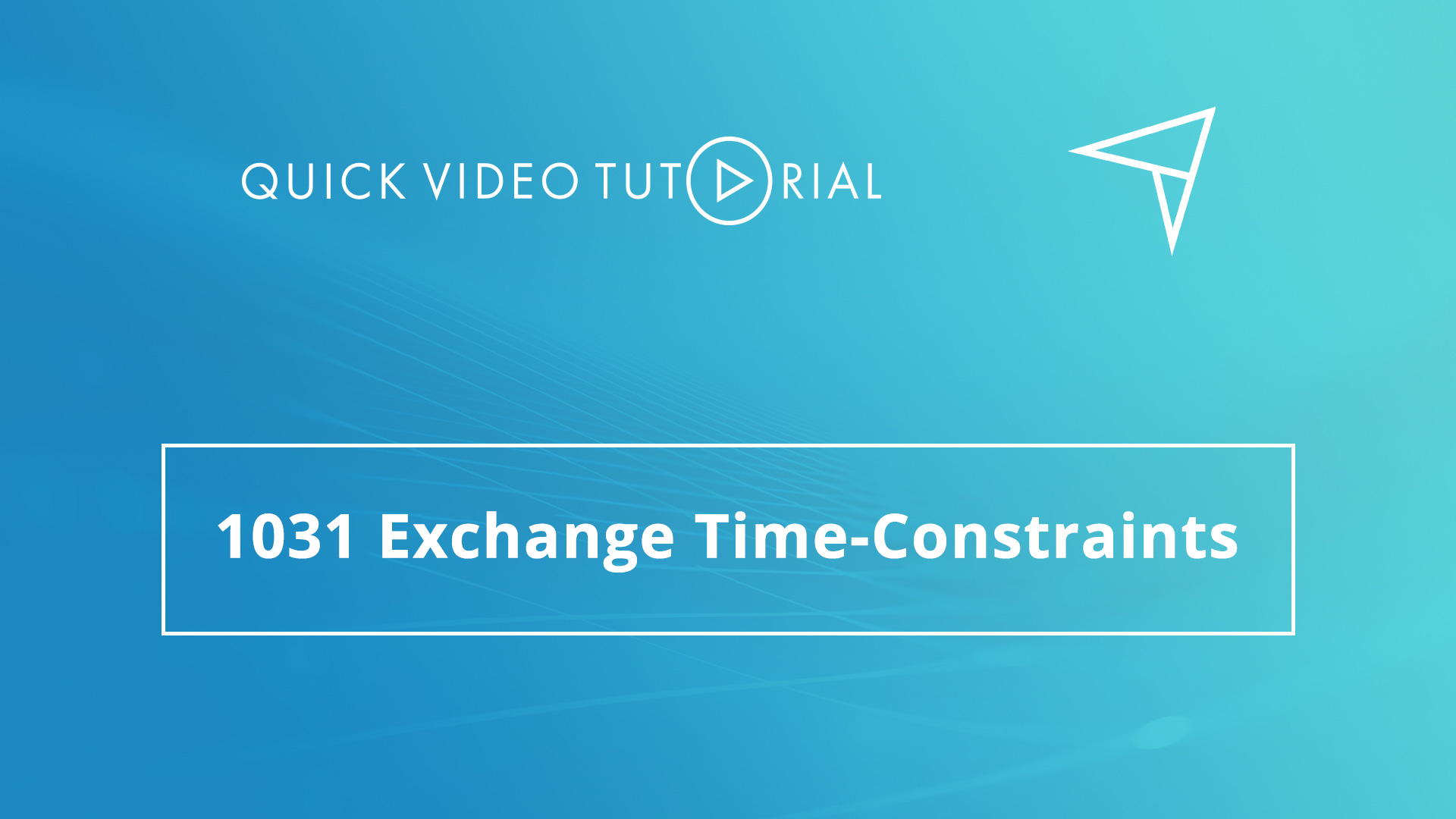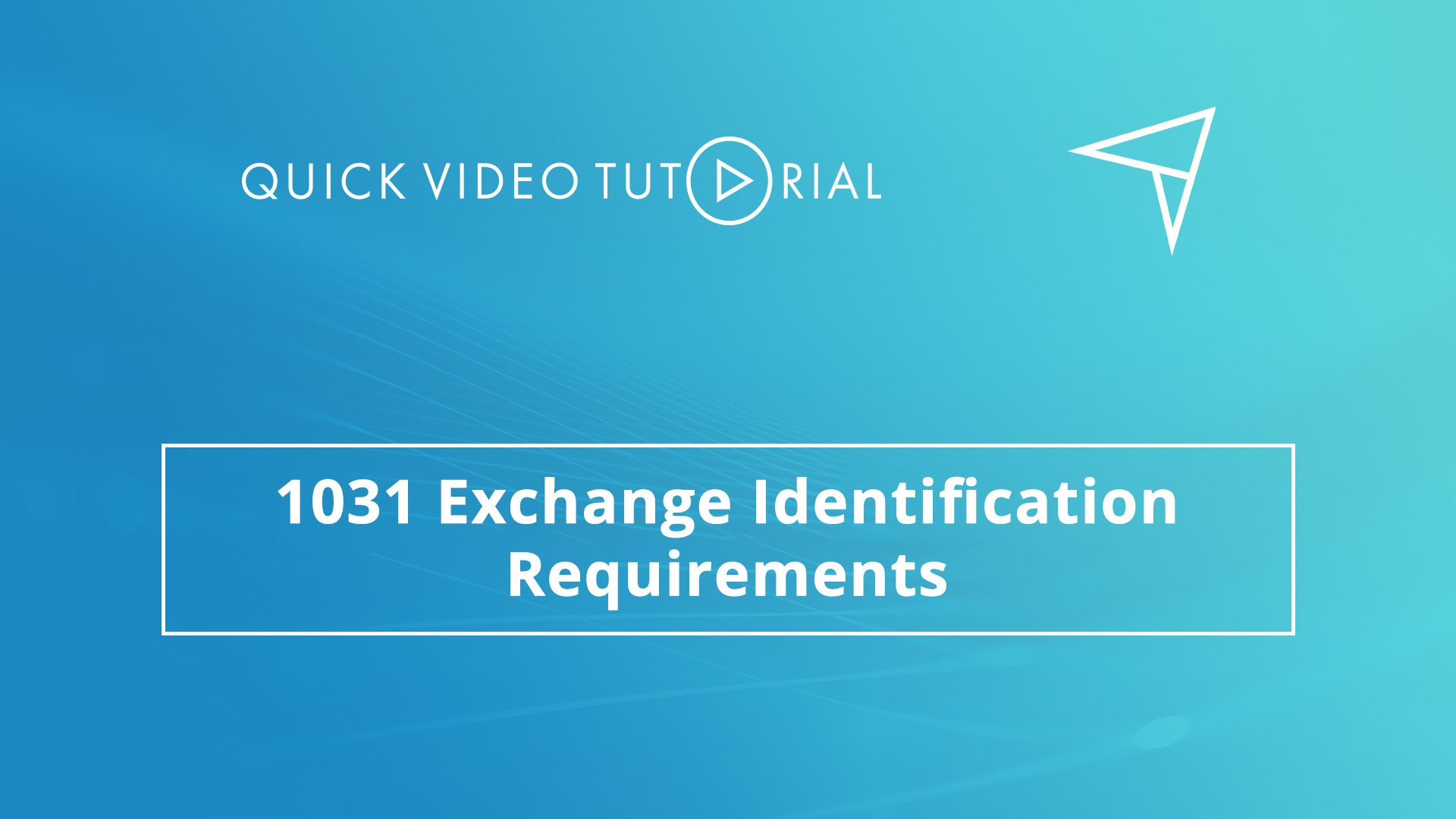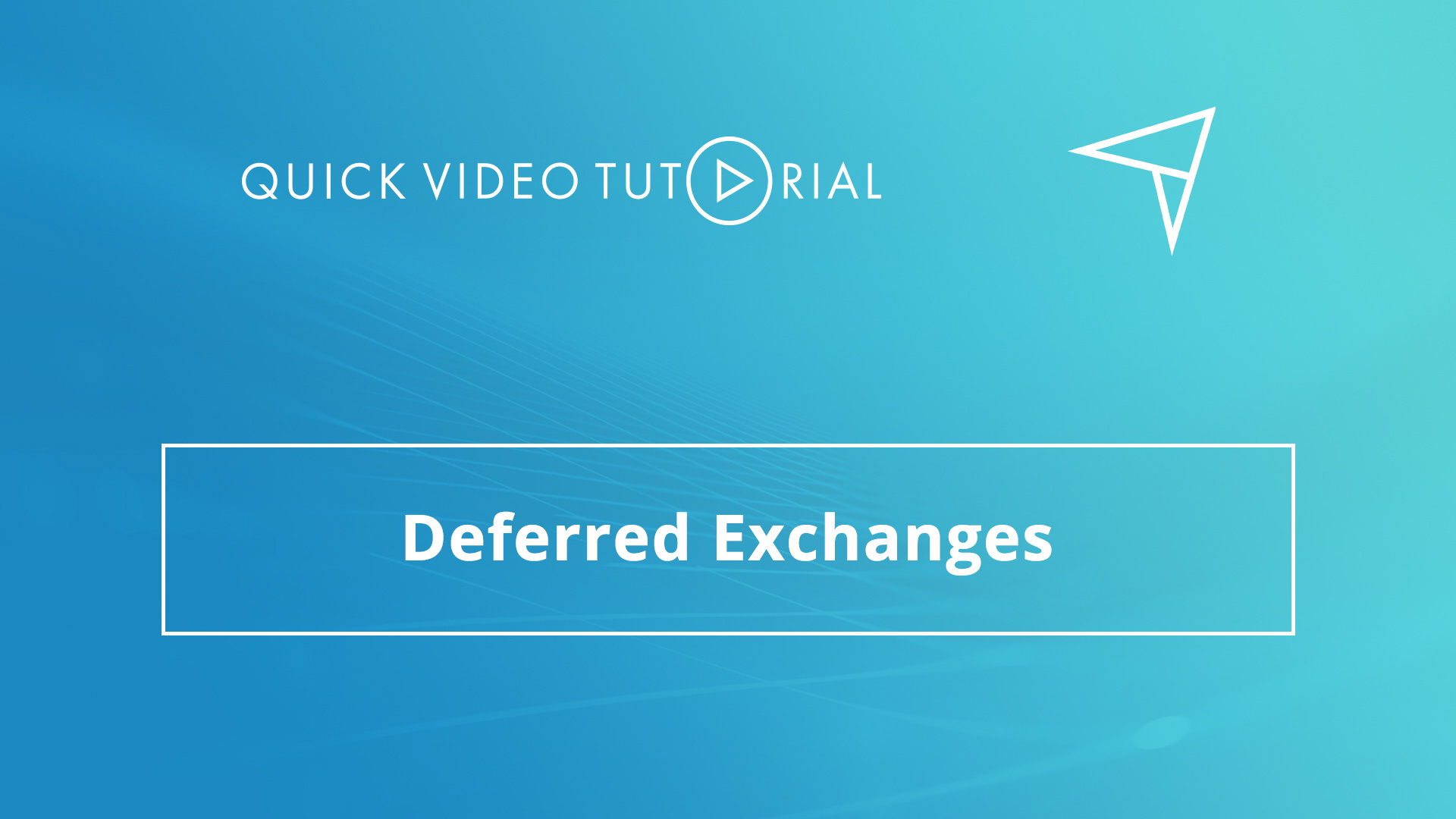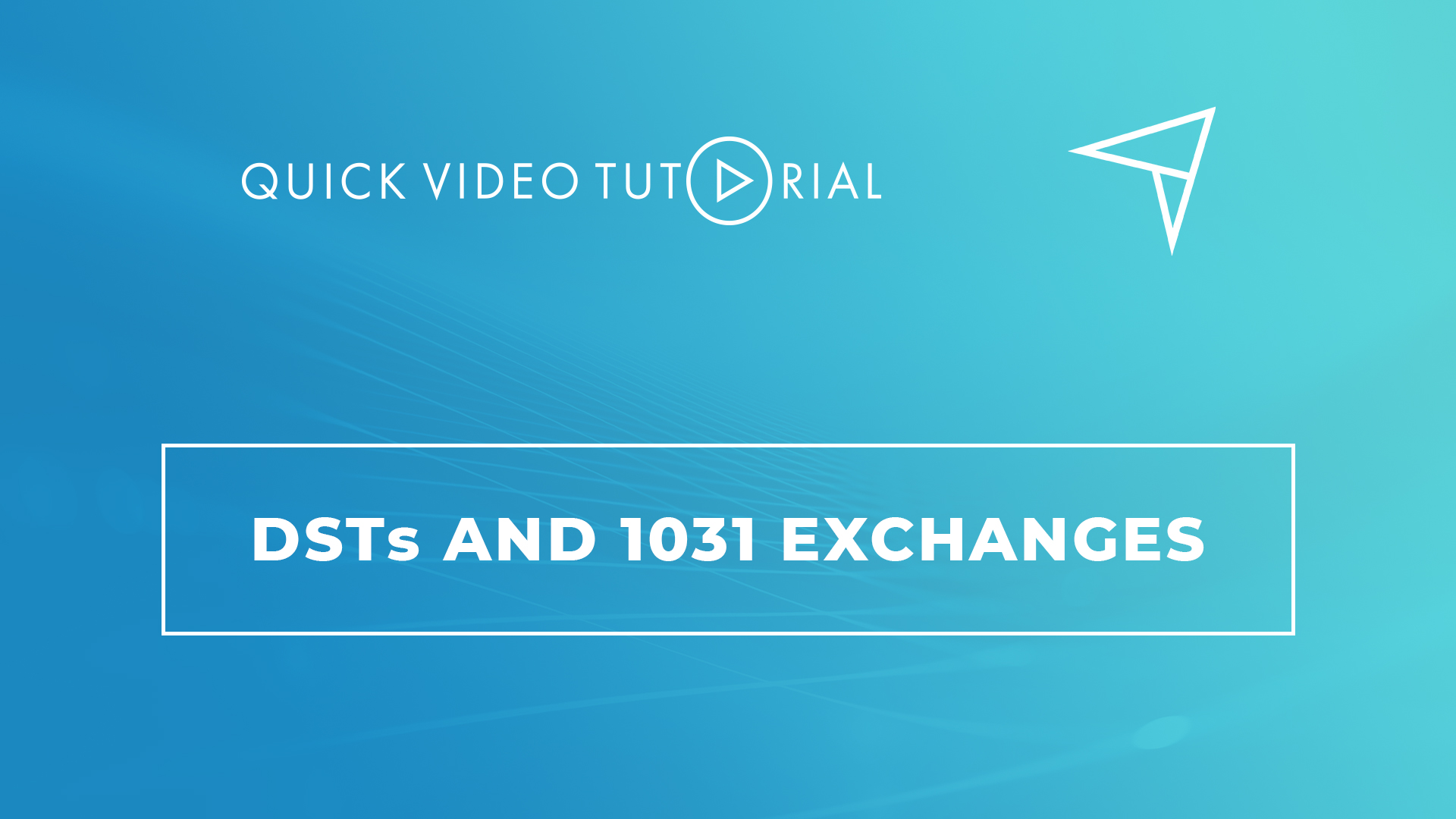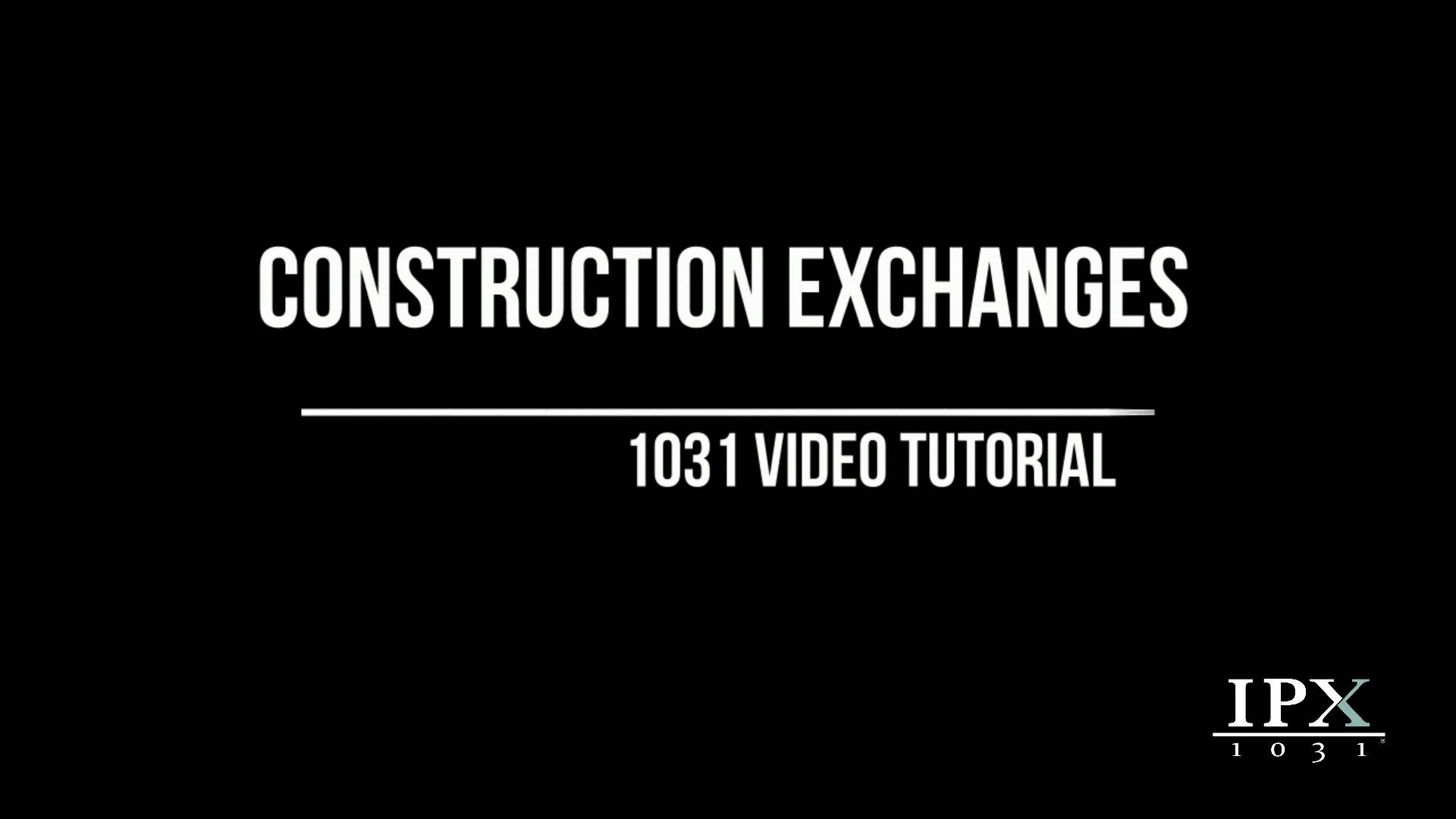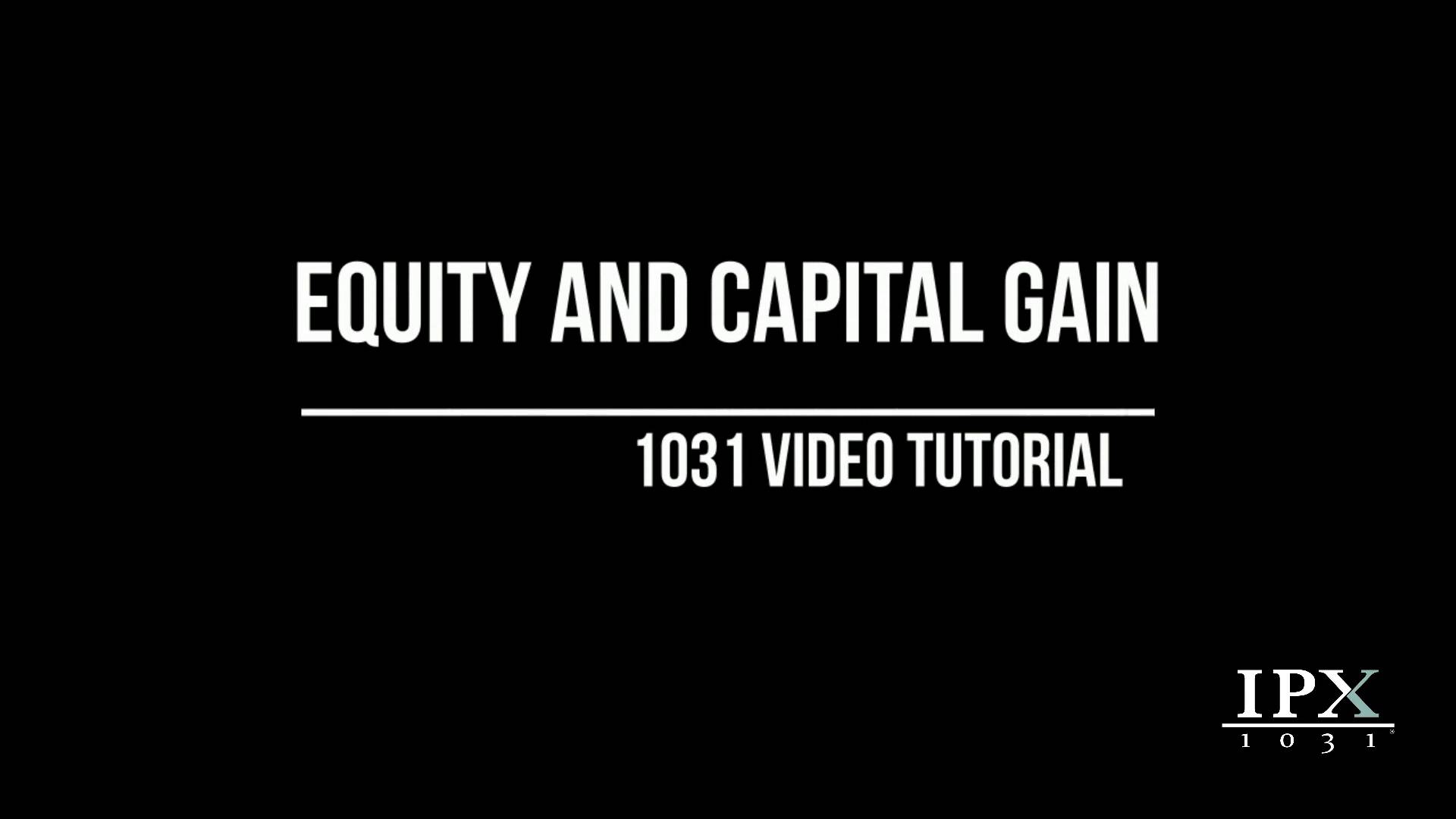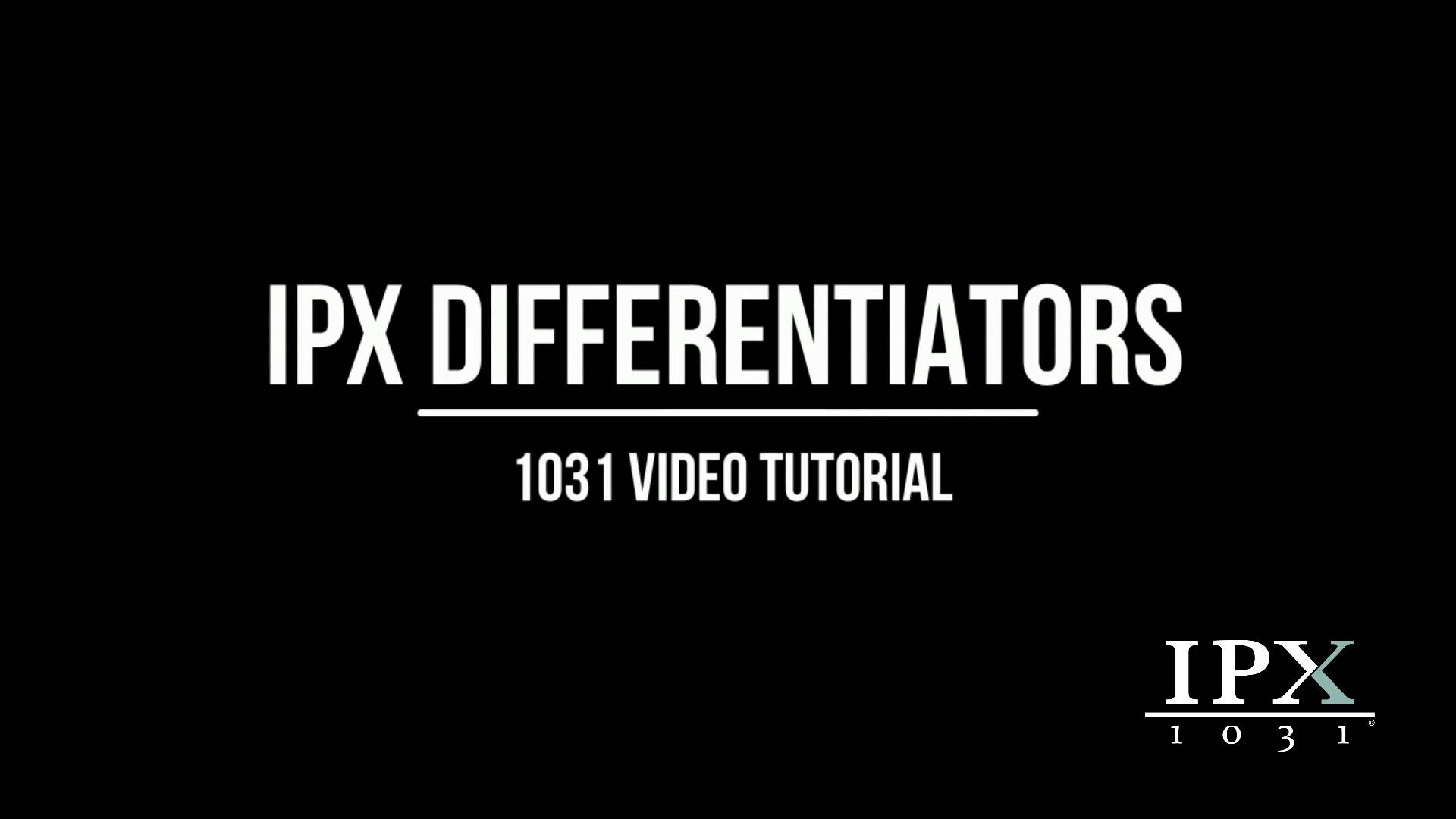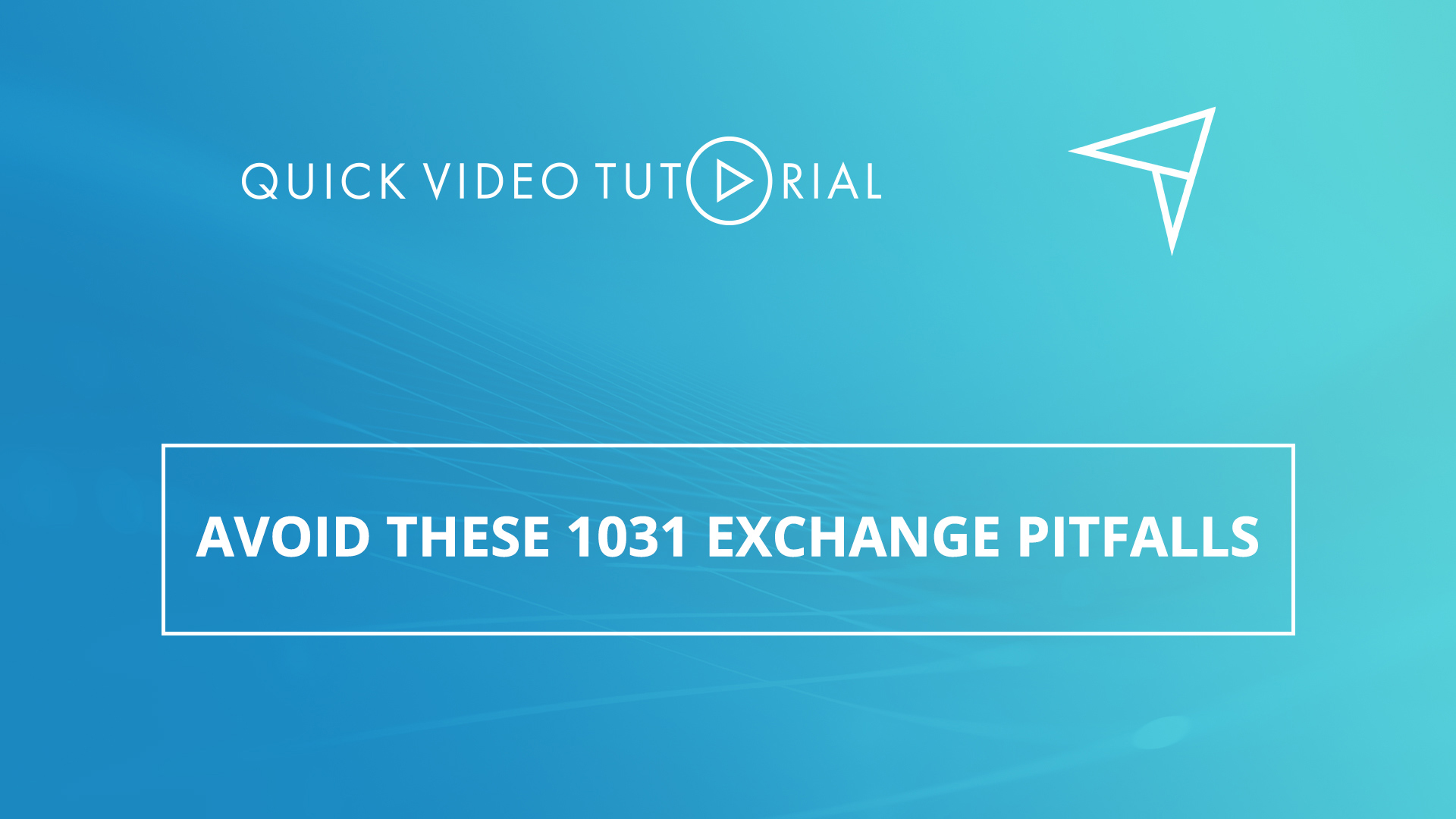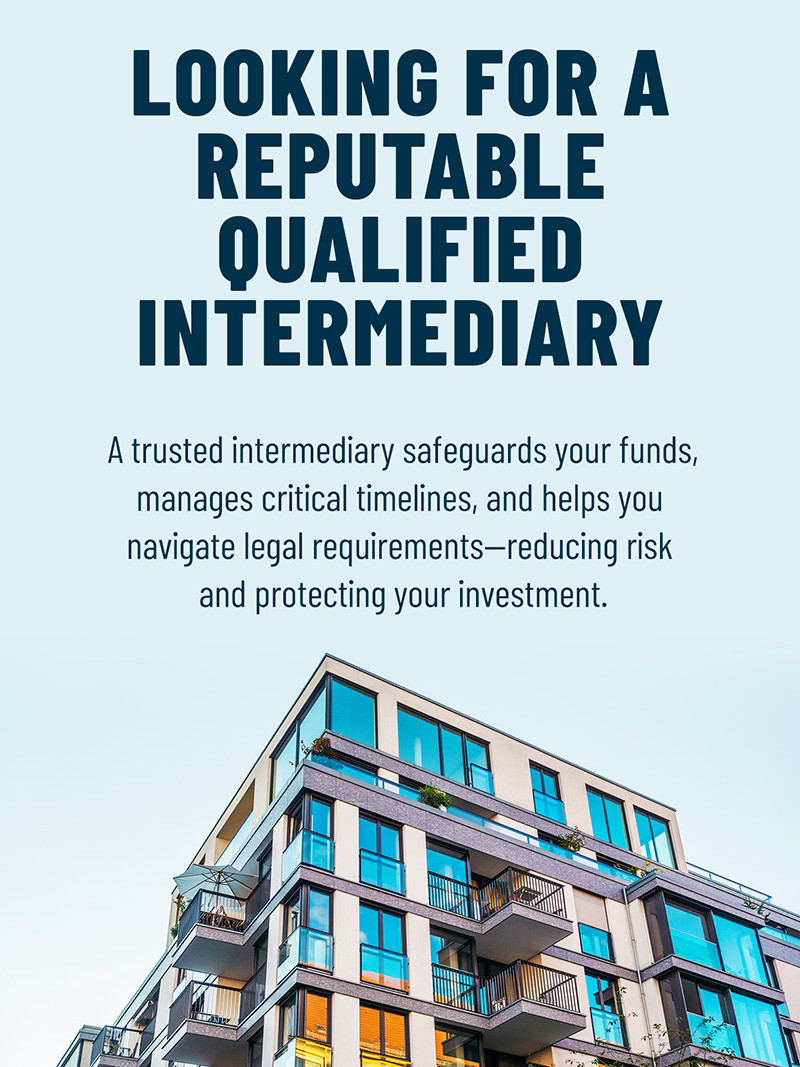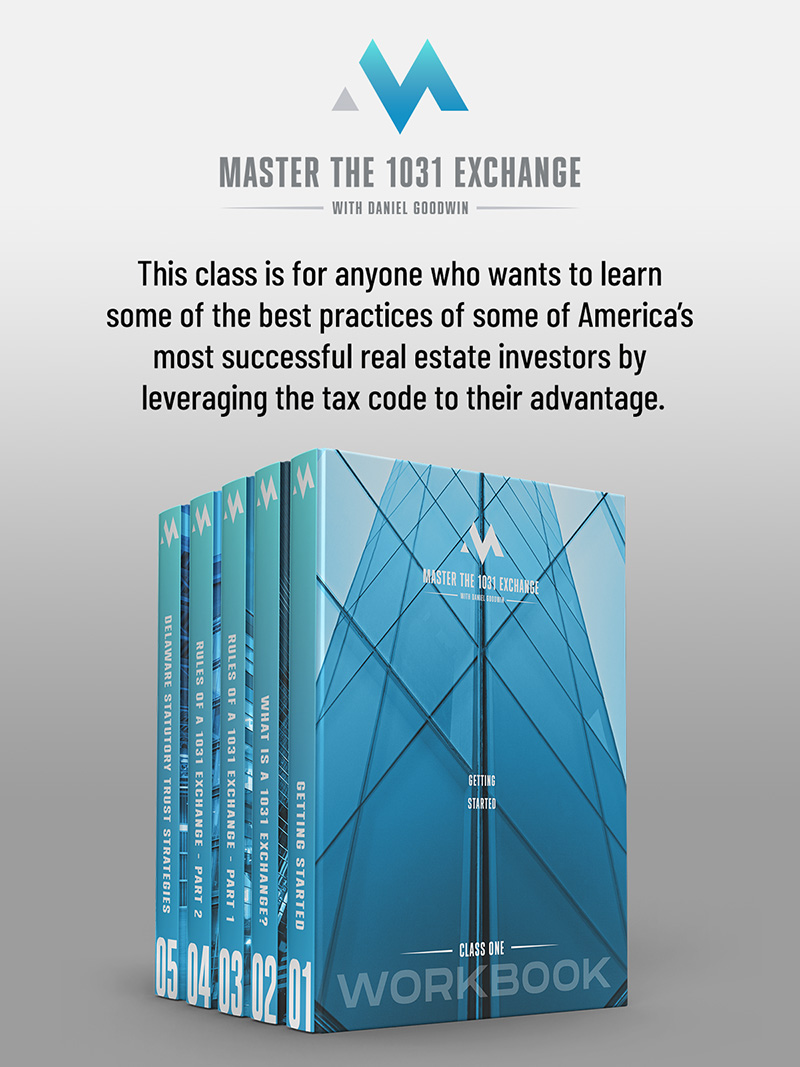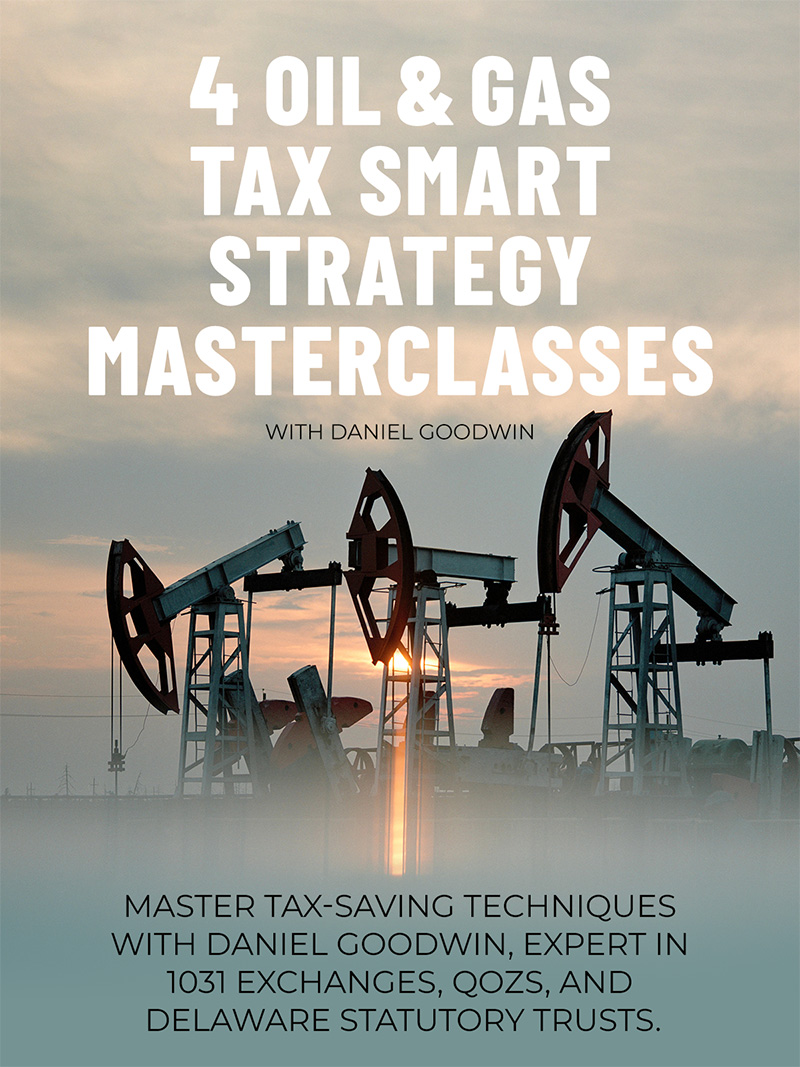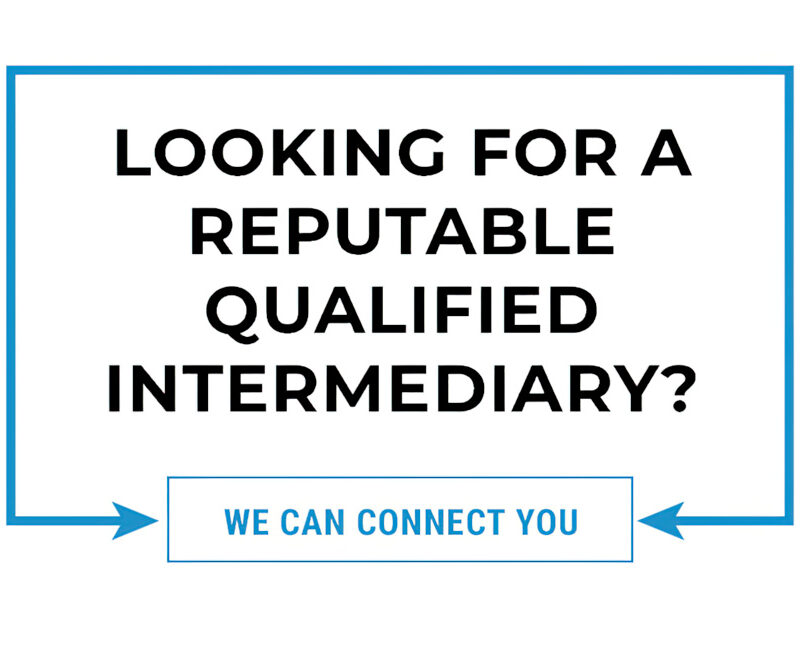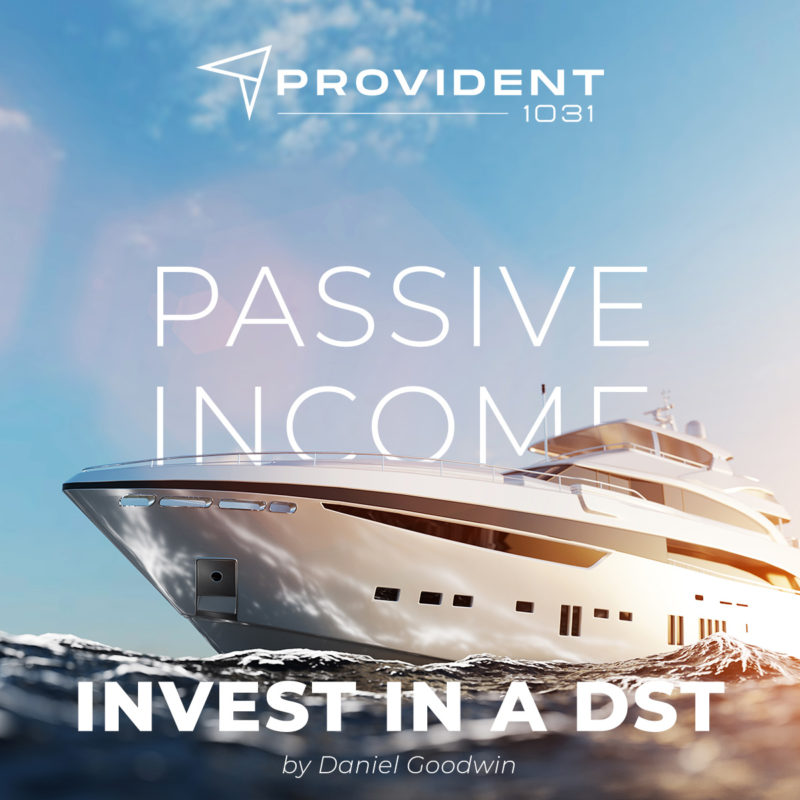1031 Exchange: Being A Successful Investor
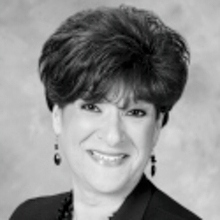
Theresa Quartaro, Qualified Intermediary
Theresa brings over 30 years of experience to Investment Property Exchange Services, Inc. in the real estate industry, focusing on banking, multifamily lending, and escrow closing. Theresa is an expert on 1031 Exchange rules and 1031 regulations and uses her vast 1031 expertise to offer clients a smooth exchange transaction. Theresa is a licensed CE Instructor on the 1031 Like-Kind Exchange and offers classes online and in Texas and Louisiana. She is a native Houstonian and is very active within the Houston community. Theresa enjoys being with family, friends, traveling and cooking.
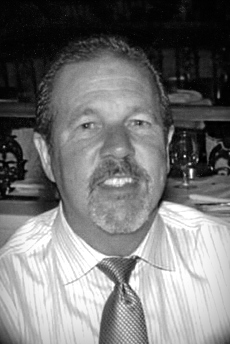
Drew Montz
Drew is a real estate subject matter expert to real estate developers. He is a graduate of Texas A&M with a degree in engineering.
Daniel Goodwin: Welcome to the real estate I’m Daniel Goodwin, the host of the real estate show.
Joining me in the studio today, I have a subject matter expert, Theresa Quartaro. Good morning.
Theresa Quartaro: Good morning. How are you?
Daniel Goodwin: Oh, I’m so glad you here the morning.
And thank you for being on our show. Theresa’s a subject matter expert in real estate and a Qualified Intermediary. Correct. We’re going to get some education from Theresa today and also to my left is my good friend Drew Montz.
Drew Montz: Dan, how are you doing?
Daniel Goodwin: I’m good. Yeah, you excited?
Drew is a subject matter expert also on real estate. He’s a consultant to developers. He’s got a real estate and engineering background. He has a construction engineering degree from Texas A&M. Drew has a unique ability to look at real estate from a few different angles.
And so, we’re going to cover some general topics today. We’re going to talk about 1031 exchanges. We’re going to talk about Delaware Statutory Trust. We’re going to talk about Qualified Opportunities. And I got to tell you guys, you know, we’re here at a wealth management firm, Provident 1031 and Provident Wealth Advisors, which is a wealth management firm.
And I got to say, I’m super excited.
So many of our clients are spread out. They don’t own all stock and bond portfolios. Many have bond alternatives, they own real estate, and they own diversified portfolios. I talk to my clients in these terms. I said, look, you play golf. If you play golf, you don’t have a bag full of drivers or putters or sand wedges.
You got a few different things in the golf bag. And I think being a successful investor involves the same thing. You got to be spread out.
What do you guys think?
Drew Montz: Absolutely, absolutely. Yeah. He stays in times.
Daniel Goodwin: Yeah. And you know, we’re all, we’re all Texans here. You know, we’re in the South, we like real estate, we like the idea of maybe controlling our own destiny to some degree.
And, Theresa let’s start with you. You work directly in the 1031 exchange. Some of our listeners are going to be seasoned real estate investors that know this stuff pretty well, but we also have listeners that have never heard of a 1031 exchange. So maybe at a high level, just talk a little bit about what is the 1031 exchange.
Theresa Quartaro: The 1031 Exchange is a way for you to be able to invest in your future, your family’s future.
You can always sell and buy greater property that could have better return higher value property. Go from no income to no income producing properties, to income producing properties. A lot of people don’t understand that when they are heirs, when that, excuse me, when the parents don’t.
Daniel Goodwin: Heirs, just take a step up in basis and that’s a great way for a state claim, a step up in base basis and be able to avoid, uh, the, the capital gains. Theresa teaches continuing education on these topics to CPAs. And many people think their CPAs know all about this stuff. And sometimes they have a high level, a bit of an understanding.
When, when we’ve talked to CPAs, we asked them about 1031. They, most of the time they know about. But very few of them are, have much understanding at all on these qualified opportunity zones. So, Theresa, my understanding is the 1031 exchange has been in the tax code since the 1920s,
Theresa Quartaro: 1921, correct 79. It was starker and 1991 it’s become the everyday they exchange delight exchanges.
We know.
Daniel Goodwin: Okay. Drew in this directly impacts your world in real estate. What are you seeing out there in the Houston real estate market?
Drew Montz: Well, Dan, the market in Houston is still very healthy. Uh, houses are moving quite quickly. We’re having, uh, neighborhoods that there’s bidding wars going on, but, uh, in the commercial business, Houston continues to expand.
And, uh, one of the things I was going to say is when Teresa talks about, uh, investing in other properties, there are a lot of different types of properties. A lot of people think, first of all, they think rental home sessile, we’re going to buy rental homes. And really when you use a DST, you have the ability to buy in a mini storage buildings in medical buildings and office buildings and warehouses that used to not be available to people of just average.
Uh, investors.
Daniel Goodwin: And so, you know where I found the rubber met the road really well, and all of our worlds is take, for example, someone that may be there as a younger couple that the husband and wife said, look, let’s start investing in real estate hunting. Get a rent house and then another one.
And next thing you know, they own an apartment complex and you know, and, and they build up some wealth and equity in real estate. Now, um, they’re getting over, you know, there may be in their sixties and, you know, they say, golly, wouldn’t it be nice to kind of enjoy our kids and grandkids and, you know, not have to deal with all of this stuff.
And so 1031 by itself doesn’t necessarily help them out so much. It can help them get from one property to another. But it doesn’t help them do away with, uh, you know, the telephone calls and all of that. And so, uh, I’ll get into the DST part, but, um, you know, I, because that can be a big problem solver for so many people.
Theresa Quartaro: Exactly. And you can, you know, that you can go to from your brick and mortar, you can 1031 and your, you can relinquish your brick and mortar and you can go into it. So we encourage our clients. If they’re up in age like that, and they don’t want to go and manage property anymore, they can actually go sell their real estate, sell their brick and mortar real estate and go and purchase it into a DST identify purchase to do a DST.
Daniel Goodwin: And at that point, if they decide whenever that DST is and his claim that can also go back into brick and mortar. So I’m going to go at a high level and say that, you know, first of all, what a 1031 is that is a tax code function that lets you sell a piece of property and move your equity into another piece of property and avoid all of the capital gains.
Now, for many people, that’s a big problem solver. You know, where as a wealth manager where we see or an application, if someone can avoid cap gains. That’s great. But if someone can also now turn on income and maybe, maybe now’s a good time. I’ll just kind of go a little bit into, I’m going to talk a bit, a little bit about Delaware, statutory trust, but Delaware, statutory trust is a structure to allow someone who does a 1031 exchange.
To move that equity over into institutional grade real estate. And when I say institutional grade, what I mean is real estate. That’s already built. It’s already cash flowing. Uh, you’ll find, uh, uh, many oftentimes endowments or, uh, private pension plans that are looking for income and as a diversifier. So drew, you hit on a couple of, you said a storage facility, so, uh, what’s, what’s better than just one storage facility might be a portfolio of storage.
Um, medical facilities, there was a hospital in Kingwood that was a DST and a Memorial Herman was the credit tenant on that pretty good property. There was a distribution center in Frisco. It’s filled up with investors now, but Amazon was the, you know, national credit and these things generate income for investors.
Now I need to pause here guys, and, um, Let our listeners know that, uh, this whole entire conversation may or may not apply to this conversation that we’re having. And by the way, Theresa a 1031, you do not have to be an accredited investor for that. No, absolutely not. Okay. So let’s make that distinction that anyone with real estate equity can potentially do a 1031 exchange.
Now there’s a lot of ins and outs to that. There’s a lot of reasons that you’re required to use Teresa or someone like to read. They’re called a qualified intermediary, their role. The way I understand it is to make completely certain that no one runs a muck and then they trigger a tax. You keep them compliant tax wise.
Right. So I can’t go do a 1031 on my own. I can’t say, Hey, look, I watched some YouTube videos. I’m gonna do it. I’m gonna kind of do that. Absolutely not.
Theresa Quartaro: There’s a code Crandall versus commissioner or the IRS code that states you must have a qualified intermediate, intermediate, right? When you transact the temporary.
Daniel Goodwin: You must have a quote, so you don’t screw it up. Okay.
Theresa Quartaro: Constructive receipt at your dollars, because that becomes a taxable event at that point.
Daniel Goodwin: So, um, so I got a little, little, little fine print in language here that when we talk about Delaware, statutory trust, which we already have brought that up. When we talk about qualified opportunity zones, that’s already come up in this conversation that only this conversation only applies to what’s called an accredited and.
Okay. An accredited investor. This has been in the securities act of 1933. It’s rule 5 0 1 in regulation, D and it says that for you to participate in a certain sort of investment like this, you have to be accredited. What does that mean? Exactly. If you’re single, you have to have at least $200,000 of income.
If you’re have earned it. Okay. Not pass, not passive income. If you’re a couple and you, then you’re married, filing jointly, you have to have at least $300,000. You have to have the expectation that that income will continue and you will have needed that income for the last two years. Now, I’m going to throw in the, or, or you have to have what.
Drew Montz: A million dollars and assets excluding your private? Um,
Daniel Goodwin: correct. Okay. Very good. Now exceptions, there are exceptions to that. It could be, you could say, Hey, what if I’m an entity? And the rules on the entity are that all of the shareholders of the entity must individually meet the accredited investor status requirements or the entity must be worth at least $5 million.
That sound right to you guys. Yeah, that’s right. That’s right up to disclosure. So this is when we talk about these things. Number one, you have to be accredited for any of this apply to apply to you. We’re also going to direct you to the [email protected] and make sure you read all of the disclosure there.
And then before anyone was to look at any sort of property as an investment opportunity. They would need to completely read the plaque, private placement memorandum. We required investors to make an attestation that they are number one, accredited and number two, that they completely read and understand the private placement memorandum.
If you haven’t done that, then none of this applies to you. You can turn the turn, you know, but we’re going to talk about 1031. So anyway, Hey, we’re, we’re really big on sec on, um, compliance and, uh, you know, so, uh, those things I’ll throw that out there, but back to the. Um, so all of the what’s some of the other properties that people could potentially invest into, you mentioned a couple three, so you’d probably, you’re seeing some of these come through your space.
Drew Montz: Well, you know, I think that a lot of people should look at other investments like medical buildings, uh, senior living hotels. Those types of things.
Daniel Goodwin: A lot of people don’t realize once again, as an average and average investor, that you can go into an institutional grade investment, which are the type of investments that are really bought by pensions teacher, retirement funds, big players, uh, you know, that you think, well, we can never buy that kind of property, but Theresa tell, you know, talk a little bit about various properties and how you can, if you relinquish one, uh, Let’s say you sell a property that’s for $2 million, let’s say thoroughly.
Drew Montz: Okay. Say it’s a piece of raw land and we sell it for $2 million. Then the buyer says, I want to find another piece of land a little bit closer into the city that I know I can make a good profit on. And then, but the problem, the problem is the land that he wants to buy, uh, is going to be $1.8. So now we’ve got $200,000 left.
Theresa Quartaro: So what do you do with that? With that $200,000, will you share with the taxpayer that he could be potentially taxed on that that is not reinvested? However, we also suggest you may identify another property. You may identify DST as a place card or, you know, take the risk and pay the taxes on it. Now, most people can be a partial exchange.
Drew Montz: Like, let’s say they had $200,000 slept. That’s what we call the boot. Right. All right. So, uh, if you had $200,000 and you go into a DST and you look at it and say, you know what, I don’t want to put a hundred thousand dollars into a medical building in Phoenix, Arizona, and I want to put a hundred thousand dollars into a hotel in Nashville.
Perfectly fine. Then you’ve got your whole $2 million, uh, without capital.
Daniel Goodwin: Theresa, could you talk a little bit about identifying the property, maybe, uh, you know, steps or processes on that?
Theresa Quartaro: Absolutely. Upon the sale and closing of the relinquished property, you have 45 days and those are 45 calendar days. So Saturday, Sunday, all legal holidays. You must have your identification in by midnight of day 45.
Whether it’s a Saturday, Sunday, or legal holiday, you don’t get the next. Now you may identify one, two or three properties with no cap on the value of those properties. Should you identify four or more properties? The aggregate value of the four of those, excuse me, four or more of those properties must not exceed 200% of your relinquished value.
Daniel Goodwin: It’s a little specific. I’m sitting at home at midnight, you know, scrolling on a tablet and I see this property and I did. I like it. And I say, honey, this is it. I, I identified it. Did I really identify what, what do I have to do to right,
exactly.
Theresa Quartaro: Once the sale, we prepare our exchange document packages, three packages.
Once it’s for the sale, we’ll prepare an exchange document package for that. The second is for your 45. What happens with that is your 45 day lateral. Several explain the 45th, the one 80th day timeframes. It will have your identification form with that.
Daniel Goodwin: You must complete that form and turn in that form to us as a qualified intermediary that will designate the form was filled out, correct correctly.
Theresa Quartaro: Yes., executed. And we sign it and send it back. Now, does a property have to be under contract? Absolutely. Caveat to that is after day 45. You may not, you might not, excuse me. You may not change your identification. Okay. So that all of these closings take place in a title company.
Daniel Goodwin: Correct. Okay. So I like to, I like to say there’s technical aspects to this and you know, don’t try it at home alone.
I mean, you can’t really do that. It’s too easy to run a muck. It’s going to cause. You know, you guys have some, some, uh, cost for, you know, the, um, to facilitate these. What’s a, what’s a ballpark of costs for someone just so they have an idea, approximately, you know, I have a qualified in intermediary advocating for me, helping me be compliant, do everything the right way, assisting me what’s that cost
Theresa Quartaro: about bringing that up, given the light at the situation today.
We are now offering $800 for the opening of the exchange, two 50 for your replacement and then any additional replacement is additional.
Daniel Goodwin: Okay. So ballpark around a thousand dollars so that you don’t make a, you know, a $300,000, the right. And, uh, you know, it’s, it’s, it’s one of those things that you have to have it.
And, um, and then your company, Theresa is IPX.
Theresa Quartaro: The largest qualified intermediary in the country by fidelity national
Daniel Goodwin: on by Fidel. Okay. So she’s, she’s accomplished she’s with a veg well-heeled affirm. They know what they’re doing. They know these things forward and backward, and then there’s all of these calculations to be made on, you know, my basis.
And I bought this for here. This is a conversation where we typically bring someone CPA into the conversation. If the CPA is not up to speed, we’ll advise the CPA, we’ll educate the CPA. The CPA has a role in all of this too, for the compliance, and then Theresa’s role as a qualified intermediary is to, uh, make sure that, uh, the closing happens and that you’re you’re you close the transaction properly.
Theresa Quartaro: And also you guys act as escrow agent for the funds from the title company, the funds are wired to IPX. They go through a patch. And they are put into a separate segregated bank account. We have there’s over 18 banks that we use in our banking departments decided.
Drew Montz: Yeah, we should say that, uh, when you’re doing a 1031 or the EST, you will never touch the proceeds.
Personally. They have to go through the title companies and their escrow. So, uh, everything is
Daniel Goodwin: compliant. So, you know, we talked about the DST, let’s maybe make a couple of thoughts about, who a DST, may or may not be for. Okay. I don’t think that, you know, everything suits everyone.
I think if you’re a younger person, a bigger risk taker, you know, that you may be in this wealth creation. And, uh, going out on your own property, do we have on something like that, you might create more wealthy maybe in place you’re willing to take more risks. So in that instance that this may not be as good, a good fit, you know, it’s not a great fit for everybody.
Um, so, you know, that’s, that’s one instance, um, because the people that do these, DSTs they say, okay, look, I’m going to get cash flow every month from this because if I invest in medical buildings, student have. Storage portfolio. Uh, what else is there? Senior living class, a all of these things generate cash flow multi.
Now this is not a offer to sell or offer any securities. Um, and please read all of them, the private placement, and please make sure your accredited investor and all of these things, but you know, people say what are cash flows? So typically they’re in the ballpark of around 5% cap. Um, but, uh, you know, total returns historically had been in the neighborhood of, uh, you know, some are higher, some are less, but around in the 8% range and that’s not an offer to sell or offer any securities rate, the private placement memorandum, but those are the ballpark of what those returns historically have looked like and what the cash flows look like.
Now, I want to go back to that couple in their sixties, or maybe the Atlanta ever made it’s a ranch, farm and ranch, and. The kids don’t want to take it over. You know, the guy is saying, look, I don’t want to do farming or ranching, or I don’t want to deal with this apartment complex anymore. They can do a 1031 avoid all the capital gains, go into one of these institutional or several of these institutional grade properties and generate a cashflow and income for the rest of their life.
And they can move from property to property, pass away, heirs, get a step up and. And if we’ve got, let’s just think about this guys. If we’ve got a farm and my grandpa’s grandpa had this farm, any guys ever watched the, uh, what’s the show with the Kevin Costner? Uh, the, uh, up in Montana. Oh my gosh. Uh, I was thinking about
So any, anyway, you know, some of these, especially here in Texas, we got these families. It could be a, a ranch in south Texas worth $10 million. Granddad’s granddad made. They bought it for a thousand dollars, you know, a hundred years ago, a couple of days. Hey, they’re all around us. Okay. So, you know, what happens is that they sell that thing.
They’re really going to get whacked. If your capital. Uh, go to a higher level than you’re at a 20% capital gains rate. If your basis is really low, let’s say you sell a $5 million ranch. You may be giving them right on the spot. I’m almost a million dollars away in taxes that you could, that one could otherwise avoid.
I got to say, that’s huge and it’s huge.
Theresa Quartaro: It’s huge. And when you lay it out and explain it like that, they’re like, wow,
Daniel Goodwin: Let’s do this. Yeah. You know, one thing
Drew Montz: I think that most people should do. You know, the first thing that when somebody goes to sell a piece of property, they’ll go to their accountant and they’ll ask their accountant, you know, what kind of tax am I going to have to pay?
Daniel Goodwin: And then the accountant tells him, and then he doesn’t mention anything about a DST or a 1031. He may not know he’s
Drew Montz: not even aware of, of the DST product. And that’s part of the reason why we’re doing this show is to get people to be more aware of. Yeah. He may have a lot of grief and, and just thinking, uh, how am I going to divide this up?
How am I gonna pay these, uh, huge capital gains taxes when I want to leave them to my, you know, four kids, but none of them want to be in the ranching business.
Daniel Goodwin: Okay. So I say we bring a CPA on it, on the show, maybe one that at least has a cursory understanding of these things. Cause, uh, you know, the course, uh, you know, the, the.
You know, technical with some of the details and questions, but I think it’s great. Um, Theresa provides the continuing education for CPAs. Let’s talk to some more CPAs just to bring more of them up to speed. Um, uh, in, in my small community here or ours around here, I’ve gone out and talked to a half a dozen CPAs and they all knew about the 1031 exchange.
I didn’t run into one of them that, that knew about the VSTS. And, um, you know, uh, they were very excited about it. They were going, oh my gosh, this could help. So many of my people now, uh,
Drew Montz: Yeah, well, let’s back up on one other thing I was thinking is a lot of people think that they have to have a hundred thousand dollars to put into this.
Daniel Goodwin: You can go a lot of these DSTs when you go and look on the website, the minimums are often $25,000 not rush, so you don’t have to be a. Multi multi-millionaire to buy part of a mini storage bill, but you do have to be accredited. So you do have to be probably if you just graduated college and your grandma gave you $25,000, you’re probably not going to feel not, but she don’t, you know, you can diversify, you don’t have to put, you know, uh, your, your eggs in one basket.
Drew Montz: And this is a good reminder that this stuff is sometimes people think, oh my gosh, all this technical stuff, it’s for the rich and famous. And I’m just a regular guy. Working say Russ is not for just the rich and famous, you know, I have so many people that asked me about buying rent homes for investments and leaving this portfolio to the kids.
And I said, you know, uh, the problem is you don’t know how much trouble you have when you buy rent homes. You have tenants that don’t comply with the rules. You constantly trying to be, you know, get the, uh, the rent check and then you have management issues. You know, pupils are gonna, I don’t want to own a rent house.
Daniel Goodwin: People will call me at 10 o’clock at night and say my disposal, it’s not working. I can’t get a Palmer over there at 10 o’clock at night. So, and then it can bring a management company and they could take away a lot of your products. I should bring my buddy, Kevin Morton on this ship. Kevin Morton in spring had a rent house.
And, uh, the guy, I mean, this was like, they could make a reality show out of this, this guy. This guy, uh, filed a lawsuit on Kevin for some sort of tenant landlord sort of issue. And the guy ended up living there for two years, not paying any rent before Kevin and Kevin spent, uh, you know, 15, $20,000 of legal fees fighting this guy over a little bit of rent.
And finally, I in my buddy, he’s my buddy, Kevin, you know, Hey God, blessing. I love this. I was always like, okay, he’s, you know, he’s going to show her some firepower and this, this tenant’s getting out of there one way or another, you know, I gotta, I gotta, you know, so it’s that kind of stuff.
Drew Montz: It’s all the time.
And then people go never will out another.
Daniel Goodwin: Yeah. And he said, so he said, okay, I get a portfolio of rentals. All you need is one that goes really kind of crappy. And it can kind of, you know, destroy the returns, the returns of
Drew Montz: everything else, talking about the, the money and, um, you know, income and such. One of the things about VSTS is that these are, uh, you know, their management is professional management.
You do not have to be involved for any part of the management. They take care of it. It is a hands-off deal, but the other thing is. As far as, um, you know, the, the, uh, loans, these are non-recourse loans. A lot of people don’t know what a non-recourse loan is, a non-recourse loan. And if you invest in a property that has a loan on it, you will not be responsible for any
Daniel Goodwin: of those payments.
Okay. So let me trick and give a translation on that. You get the CST, and if there is leverage on it, you’re not responsible for that loan and you won’t have any. Okay. And when you own private deals, you know, you usually got to personally guarantee that you’re reliable, your rest of your assets are exposed and liable.
And then if it doesn’t go well, they may call you up and say, Hey, we need cash for this guys. Uh, I’m having such a great time talking about the show. I almost forgot. We need to talk about qualified opportunity zones. Okay. So, uh, Q O Z. Some people, uh, had a couple of people say, you know, I heard about this in, uh, president Trump’s state of the union address.
And he talked about qualified opportunities zone. So let me get, let me get the lay of the land a little bit. This is a, some legislation. And I want to say that, uh, Corey Booker was one of the first people that, uh, who’s the other one drew, do you recall? There was, uh, two of these senators that kind of got on board with this idea and Trump liked it and they got, it was folded into the 2017 tax and jobs.
Cutting. And so there are 8,700 census areas all around the United States. The governor of each state identified as areas that could use a little help to, uh, know vital as a revitalization. Yeah. So if you’re a Houstonian, like we are here, you’re thinking, okay, maybe we’re talking about some neighborhoods over there.
The minute maid park or, you know, kind of up and coming, they were, they were kind of crappy neighborhoods and now they’re up and coming. They make no mistake. A lot of these properties are in crag neighborhoods where you would never want to invest any capital.
Daniel Goodwin: There’s some neighborhoods where you would drive by and say, I would never, you know, invest my capital. However, there are what these, what these real, let me tell you about some of these real estate companies. So one of the ones that pops into my mind is a Cantor Fitzgerald that we work closely with Kantar.
Um, and sometimes people know the name of that company because at nine 11, um, they were, it was, they were a smaller company than they had 900 employees, but on 9-11, 600 of their employees died that day. Okay. And they weathered that storm there. You might’ve known of them as a bond shop. They’re a real company.
But when we had the financial crisis, they, you know, bought a real, a lot of real estate. I think they are a worldwide company now with around 13,000 employees around the world. So companies like them and others have vast real estate department and resources. They’ve gone in with all of their examination tools.
And demographic studies on all of these census tracks on these qualified opportunity zones and they found, Hey, here’s an anomaly there, you know, meaning that a property that stands all on its own merit. Okay.
Give you an example. Do you think pretty highly of, uh, uh, Western university in, down in Houston, of course, there’s parts of west you that are opportunities that are in the opportunity zones.
And so they’re going, Hey, if this thing stands all on its own merit investors can get mad. Tax savings by, you know, if they sell a company, moving capital gains into investments, getting a deferral with their capital gains for a long period of time and getting a step-up in basis for those gains. And then also getting tax-free growth on those investments.
Now, once again, Back to your disclaimer, accredited investors only read the private placement memorandum. First, this is not an offer for any listeners on the internet to buy, sell, or trade any securities. But, uh, oops. There’s uh, some super properties, you know, like in the Woodlands, you guys are familiar with market street.
There’s a whole development like that. It’s filled up with capital very fast. It was next to the Xcel energy center in Minnesota, twin cities, where the Minnesota wild hockey team. You know, right there, there’s one in Colorado Springs right now. There’s others that are coming up and there’s a tremendous amount of investment capital flowing into these right now.
Tracy, have you ever seen them?
Theresa Quartaro: We don’t facilitate the opportunity science. We have a little bit of information on them and I can share that with you. But there are people that ask now, if they have a failed exchange, They can then take those funds and, uh, invest into a opportunity.
Daniel Goodwin: That’s a super point, Theresa, because how many of these, these, you know, people try to do a 1031 are making their best efforts to maybe sell this apartment complex and go into another apartment complex. They’re not ready to just, you know, get a cash income, but they can use this in a pinch, right? Yes, absolutely.
Drew Montz: So now what, tell me, what’s the actual definition of a failed exchange.
Theresa Quartaro: Let’s just say he gets today. 45 has not identified any okay. Has not identified any property after the deadline. His funds can be returned to him that exchanger the next business day after that. So that’s important that for people to know, um, let’s just say he’s given us his identification state.
It’s logged down. He gets today 51 picking day out of the year property. He’s identified three properties, probably number one, doesn’t work for whatever reason. So he has property number two to go back to right. Probably next to right. Exactly. Cause sold inspection reports come back. Something’s not right.
Number two. Same thing. Something’s wrong. He said I’m not going to buy it. It’s not really in the area that I would like. So he still has property. Number three gets today. Huh? Still not comfortable with that property. He cannot identify additional property. Therefore, his exchange fails because he chose not to purchase any of the properties identified.
We can then return those dollars. The next business day after day 180 capital gains. Correct?
Theresa Quartaro: There’s no penalty. Right. Exactly.
Daniel Goodwin: He pays capital gains. So the important thing is there are numb to remember, cause we got to wrap it up here pretty quick. I’ve said there’s a number of really great solutions. Get your CPA on the phone with us. We’ll educate your CPA about this. Don’t don’t make the mistake of thinking that your CPA knows the ropes of this.
My gosh, do you know how many things that they have to try to be and stay on top of right now? And, you know, they do a great job of getting the compliance work done, but don’t ask them to be expert, subject matter experts in all of these areas, you’re going to need someone like Teresa and your girl corner.
You may need a real estate consultant. Someone like drew and from a financial planning, wealth management perspective, someone that can help you look at the various offerings out there in a qualified opportunity zones. Um, well, I’ll share our contact information with you here shortly. So Theresa, if one of our listeners, uh, you know, wanted to reach out to you, maybe, maybe that may put their property on the market yet.
And they just said, I want to better understand this whole 1031 and how this may or may not apply for me and what the opportunity is. And I just want to talk to somebody, tell our listeners how someone might just get in contact.
